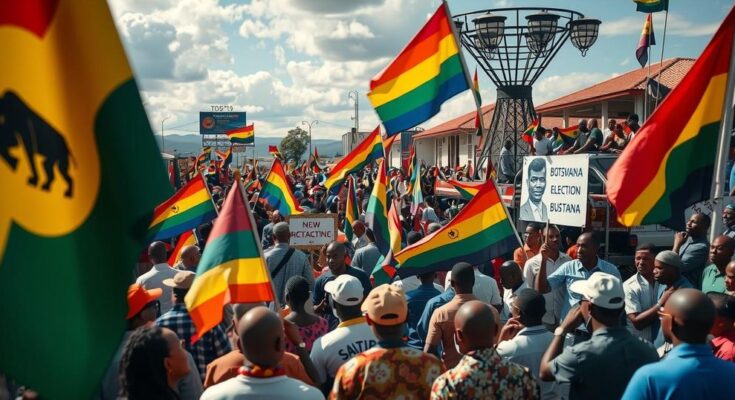Botswana’s election on Wednesday will see the ruling Botswana Democratic Party, led by President Mokgweetsi Masisi, seek another five-year term amid economic challenges and climate change concerns that have led to increased unemployment. The election will also highlight tensions between Masisi and former President Ian Khama, who opposes his incumbency.
On Wednesday, citizens of Botswana will cast their votes in an election that could extend the ruling Botswana Democratic Party’s (BDP) lengthy governance for another five years. The BDP, which has held power since the nation gained independence from the United Kingdom in 1966, faces significant challenges including a struggling economy and the adverse effects of climate change, which threaten the stability that Botswana has historically enjoyed. This one-day election will determine the composition of parliament, after which the lawmakers will elect the president. Current President Mokgweetsi Masisi, hoping to secure a second and final term, is a former educator and United Nations official. However, he confronts economic headwinds; a downturn in diamond demand coupled with an increased cost of living has driven unemployment rates up to a staggering 27%. To address these pressing issues, the BDP has pledged to diversify the economy beyond its dependence on diamond mining. The risks associated with climate change, particularly desertification, present additional complications, underscoring the fragility of this landlocked nation. Masisi’s main contenders include Duma Boko, leader of the Umbrella for Democratic Change, Dumelang Saleshando of the Botswana Congress Party, and Mephato Reatile of the Botswana Patriotic Front. This election is poised to reignite tensions between President Masisi and former President Ian Khama, who has accused the current administration of authoritarian practices. Khama, having returned from exile in South Africa to support his allies, claims that the legal troubles he faces are politically motivated. As the voting concludes, counting is anticipated to commence later today.
Botswana has experienced a relatively stable political climate and economic growth since achieving independence in 1966. The BDP, which has maintained power throughout this time, has often been touted as a model of governance in Africa. However, recent years have seen mounting challenges, particularly regarding the economy’s heavy reliance on diamond exports and the impacts of climate change. Consequently, the election serves as a critical juncture for the nation, as it seeks to adopt strategies for economic diversification and address unemployment issues effectively.
In summary, as Botswana approaches its election day, the ruling BDP is under pressure to navigate significant economic and environmental challenges while contending with opposition candidates and the legacy of former President Khama. The outcomes of this election will not only determine the future of leadership but also the strategic direction of Botswana’s economic policies in the face of mounting unemployment and changing climatic conditions.
Original Source: www.namibian.com.na




